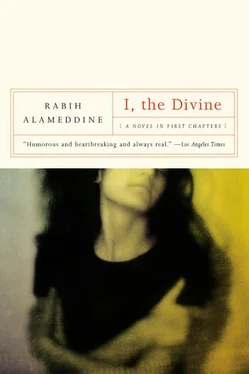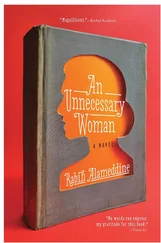I am unsure of exactly what happened in September. I started school and hired a nanny for Kamal. Omar objected to my going to school, suggesting I wait another year for Kamal’s sake. I did not think it wise, did not want to end up like Janet. My going to school was not the cause of our problems. Omar may have begun to nag at times, but his behavior changed little. My behavior did not change either, but my feelings did. He would still try to involve me in mischievous things, like the pillow fights we had had since we met, but I started seeing them as puerile. I began to hate the way he ate. I noticed in his interactions with other people that he was not just shy, he was a wimp. I do not know whether the change was sudden or gradual, but it was palpable. I hid it well, but I could not stand him anymore. My own fairy tale had ended.
We never fought. Only on one occasion was I curt to him. He loved tickling me. No matter what I was doing, he would tickle me and I would drop everything and we would end up laughing. The last time he tried, I was studying for a final. I screamed at him to stop acting so childish. He was terribly hurt, like a little boy, and I had to apologize.
He was the perfect father. He helped with Kamal whenever he was not in school, doting on him continuously. He thought we had a wonderful marriage, was still in love with me. His peace and happiness lasted till February, when he began talking about going back to Beirut in June as soon as he graduated. It took me completely by surprise. I needed another year to finish. He thought I could finish in Beirut, if I really wanted to. Beirut was a living hell in those days. The fighting was some of the worst of the war. The elections were coming up and no one knew what was going to happen. Most of the Lebanese were leaving Lebanon, not moving back. He was surprised at my stubbornness, as he called it. We were Lebanese, our place was in Lebanon. Kamal’s place was with his grandparents, both sets, and his family. I tried to bargain. We could wait another year until I finished, until we figured out what was going to happen in Beirut. Omar would not budge. He missed his family, his friends. He wanted his parents to help with raising Kamal.
I made a mistake in underestimating Omar’s desire to move back to Lebanon. I did not understand his alienation in New York. I loved the city, he hated it. I felt at home while he felt like a foreigner. It was only later that I realized he never made any friends in the city. All of our friends were mine. He tagged along simply because I asked him. I was having a ball, while he was counting the days until we could go back.
I also underestimated his sense of property. I belonged to him. I was his wife. Kamal belonged to him. If the man wanted to go back to Beirut, then we were all going. The more I objected, the more adamant he became. I do not think either of us realized the corners we were painting ourselves into. We never raised our voices, but we dug our trenches. War or no war, he was moving back. I was not. Did I want a divorce? It would be for the best. He was taking Kamal back to Lebanon. I could not do anything about it. How was I going to live in New York without any money? I could keep the apartment till I graduated, and I would get fifteen hundred dollars a month for as long as I lived. How could I live without Kamal? I could come see him in Beirut anytime. I was Kamal’s mother. Omar would not stand in the way of my being with his son. That was it. In June, my husband and son left me.
That year, until I graduated, was one of the lowest times in my life. I missed Kamal tremendously. My parents in Lebanon were upset with me when I got married, and were more upset when Omar left me. For them, I was always to blame. The war in Beirut intensified, with the Israeli invasion, the blowing up of the U.S. marines, and the massacres at Sabra and Chatila. I was worried about my family, my son, and everyone. I concentrated on my studies.
I worried about the fact that when I graduated, I would not be able to stay in the United States legally. My student visa, an F1, would expire. I thought I could try getting an American passport since my mother was American.
Luckily for me, another graduate engineering student became infatuated with me. We were going to graduate at the same time, he with a master’s degree and I with a bachelor’s. Joe was the spitting image of Omar, but without the shyness or funny speech patterns. He was from a rich family. This time his parents did not approve of me both because I was not Jewish and because they thought I was after his money. I had practice with minor obstacles by then.

The last time I saw my mother was the day of my first and only New York opening, January 19, 1995. I went to visit her in her Upper East Side apartment. I had been dropping in on her the previous couple of days, trying to talk to her, not about my painting or the impending show and my nervousness about it, but about the problems I was having with David. I thought she would be able to help. All she could talk about were her memoirs. She saw herself as an artist, a painter, although she never really painted, having all the neuroses of an artist, but none of the talent. She had given up painting for the past year to concentrate on writing. “Write, write, write,” she said. “All I do is write. It’s so liberating.” I asked to see, but as usual, nothing was ready to be shown. “I’ve hired a professional editing firm to clean things up before I’m ready to publish,” she told me.
That day she was radiant, wearing a green dress, long, to the ankles. She was in a good mood, almost manic, moving constantly, nervously flipping her red hair back every few seconds. “I’m so excited for you,” she said, “and I’m at a great place in my writing. It’s going well right now, so we have more than one thing to celebrate.” She would not elaborate. “You want to see something funny. I bought this voice recognition thing for my computer a couple of months ago. You speak into it and it types the silliest things. You know how awfully I type. I thought this would help, but it doesn’t work, and I still have to type. Anyway, it’s great fun. Come.”
She led me to her office. The desk was impeccably clean, like the rest of her sparsely furnished apartment. I sat down at the computer and spoke into the attached microphone. “My name is Sarah Nour el-Din and I want to type something.” The sentence appeared on the screen as “A cane barter poor meeting no finance upward to bin.” It was hilarious. I spoke again and again. The words typed on the page had nothing at all to do with what I said. She laughed, called it contemporary poetry. I tried to type something, hit the keys repeatedly, but nothing showed up on the screen. I asked my mother if she knew why her keyboard was not working. She did not. It was obvious to me, a non-computer-geek, that the voice recognition software was interfering with the keyboard. For her to type on her computer, a technician would need to solve the compatibility problem. I did not mention it. We parted, kissing at the door, her hand surprisingly lingering on my face. I knew she would not show up at the reception, but I thought she would come up with some excuse the next day when I called her. I was wrong. That night she cut herself with a razor in the bathtub, not just her wrists, but all over, and bled to death.

It was endless, that afternoon. The ocean was calm, limpid, vast as the sky. But the color was wrong. It was gray, not the blue-green I was looking for. I had moved from New York to San Francisco to see the sun set in water. But it was wrong. The sun disappeared into oblivion at strange angles and with the wrong colors. I drove to the beach that afternoon to think. I sat on the sand, wondering what to do. I felt I needed some drastic changes. Should I move back to Beirut?
Читать дальше














